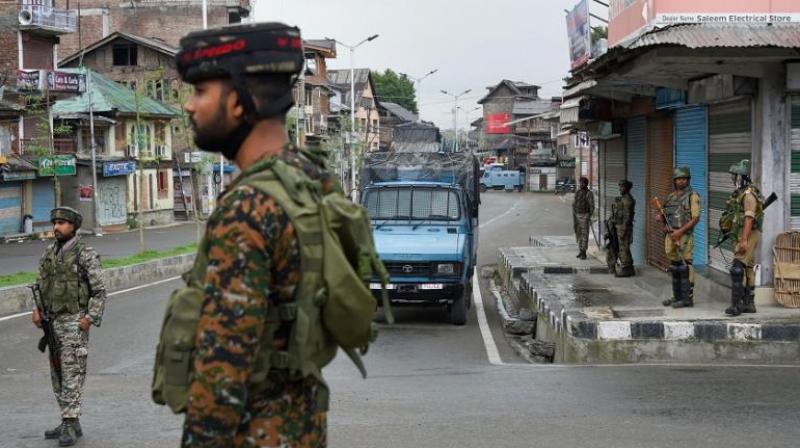J&K: Why no endgame appears to be in sight

The government’s plans for Jammu and Kashmir remains far from clear even after several weeks of a total lockdown of the population. As in its earlier “bold” policies like demonetisation and the implementation of GST, once again the government shoots from the hip and waits for the consequences.
It will not be quite so easy for the government to declare “finis” in Kashmir because the resulting political fallout of its measures is still unclear and several factors have not been accounted for.
The biggest unknown is the how the Kashmiris will react. Not only to the removal of the special status of J&K and the bifurcation into two Union territories, but also to leaders of the ruling BJP publicly gloating about outsiders being now able to buy land in the state. The “Han-isation” of the Kashmir Valley, after the manner of China’s premeditated settling of Han Chinese in Muslim-dominated Xinjiang, has been a central theme in the political imagination of key decision-makers in the Narendra Modi government.
To add insult to injury, a BJP leader went on to suggest that party workers could now marry “fair Kashmiri girls”. Haryana chief minister Manohar Lal Khattar was (mis)quoted as saying that whereas earlier women from Bihar were brought into Haryana for marriage because of its skewed sex ratio, “now some people are saying we can bring them from Kashmir”. No one knows how, when and with what intensity a humiliated and insulted Kashmiri population would react to such leery claims over land and women once the lockdown is fully lifted.
The next unknown is Pakistan’s reaction. It would be a mistake to assume that Pakistan will do nothing beyond formal protests at every available international fora. Neither the public nor the political-military establishment is going to be satisfied with these measures. Pakistan will have to opt for covert action against India. Past experience shows that India’s ability to predict or deal with such actions has been remarkably poor. This was evident in 26/11 terrorist strikes, in the Pulwama suicide bomb attack more recently and in Pakistan’s tit-for-tat retaliation for the Balakot airstrikes.
The third unknown is the reaction of the mainstream Kashmiri political leaders once they are released. If they take a stand against New Delhi, then the situation in Kashmir could become even more unmanageable. They have the credibility to lead public protests, especially if they were to “atone” for carrying the Indian tricolour for the past seven decades. This may be why the government is carefully vetting its list of Kashmiri politicians for releasing only those who “pose the least threat to the law and order situation”.
Mehbooba Mufti of the PDP with her street fighter reputation could attempt to regain her lost political credibility. Even Omar Abdullah would find it difficult to stand with New Delhi under the prevailing circumstances. Reports suggest that the top leaders of the Peoples’ Democratic Party (PDP) and the National Conference (NC) will continue to be incarcerated for now.
It is unclear whether the policymakers in New Delhi have a clear strategy of winning over ordinary Kashmiris after rubbing their nose in the dirt. The time-tested formula of announcing development grants and packages is unlikely to work because that still denies the political nature of the problem.
Some hope that once the apple season picks up in September, things will cool down. Experience, however, suggests that the fruit trucks have moved, bypassing cities and at night, even when popular protests have taken place. The experience of the economic blockade of August 2008, when the Hurriyat Conference gave a call for “Muzaffarabad chalo”, in a symbolic bid to evacuate local fruit crop via Pakistan-occupied Kashmir, would suggest that no attempt would be made to prevent Kashmiris from selling their apples or pears. In short, New Delhi can neither determine nor shape the protests in Kashmir.
New Delhi can also do little about Pakistan’s reactions. The ruling elite in Pakistan will do everything it needs to do to legitimise its hold on power. At best, under pressure from Washington, India may offer a dialogue to Pakistan.
New Delhi’s only possible hope is still the political class in J&K. It must work out some modus vivendi with its members before they are released. There are unconfirmed reports that some unsuccessful approaches have already being made. Omar Abdullah’s trusted lieutenant Devender Singh Rana (brother of Jitendra Singh, a minister of state in the Modi government) has been released and is in New Delhi.
Meanwhile, the government’s attempts to create a new Kashmiri political leadership continues. Nothing else can explain the re-arrest of a former bureaucrat and wannabe politician Shah Faesal. He had been released after his initial arrest, and then on the basis of a “lookout notice” issued by the Intelligence Bureau was rearrested with orchestrated fanfare and publicity. The attempt seems similar to the creation of the PDP in 1998 by the powers that be in New Delhi.
At best, what the government can offer the arrested Kashmiri political leaders is the prospect of full statehood for the truncated J&K. The offer to bring in laws to limit outsiders from buying land in the state as in some hilly and tribal states may also be dangled before them. These inducements, however, may not lead to the re-emergence of Delhi-centric politics in Kashmir.
The euphoria in the rest of India about the government’s decisions on J&K also seems to be petering out in the face of increasing economic woes. Otherwise, where was the need for the BJP to announce that it would hold public meetings in 35 major cities and 370 small ones to educate people about the government’s “historic move” on Kashmir?
Such desperate antics suggest that the political planners in New Delhi believe more in thinking on the trot than in operationalising a well-thought out strategy. Strategic thinking seems to have been replaced by political optics in the Narendra Modi government. This is the reason why it has no endgame in mind for Kashmir.

